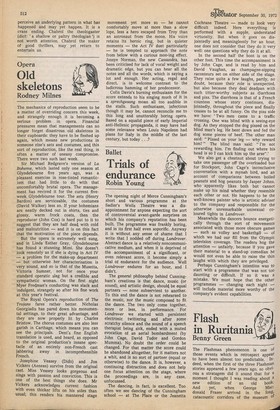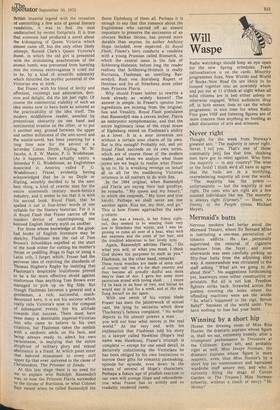Flash in Ruritania
Benny Green
The Flashman phenomenon is one of those events which in retrospect appear to have been almost too predictable. In deed, when the first of the three Flashman stories appeared a few years ago, so obvious a stratagem did it sound that for a moment I thought I was reading about a new edition of an old book. And yet, when George Mac' donald Fraser arrived in the lone,, catacoustic corridors of the museum °I British imperial legend with the intention of committing a few acts of genial literary vandalism, it was to find ihe dust undisturbed by recent footprints. It is true that someone had produced a novel about the kidnapping of Queen Victoria which almost came off, but the only other likely attempt, Ronald Clark's Queen Victoria's Bomb, in which the old girl is presented with the stimulating anachronism of the atomic bomb, was prevented from bursting into the riotous extravaganza it cried out to be, by a kind of scientific solemnity which throttled the mythic potential of the Victorian era at birth.
But Fraser, with his blend of levity and affection, contempt and admiration, derision and delight, did the job just right. Of course the commercial viability of such an idea seems now to have been as assured as the practicability of the idea itself. The modern middlebrow reader, assailed by pretentious obscurity on one hand and sentimental evasion on the other, or to put it another way, ground between the upper and nether millstones of the anti-novel and the auntie-novel, has been yearning for a long time now for the advent of a latterday Conan Doyle, Kipling, W. W. Jacobs, A. E. W. Mason, P. G. Wodehouse. (As it happens, there actually exists a latterday P. G. Wodehouse, an Englishman domiciled in America called P. G. Wodehouse.) Fraser, evidently having acknowledged that he is no Doyle or Kipling, sensibly decided to be the next best thing, a kind of rewrite man for the entire nineteenth century mock-heroics industry, and, it seems to me that it is with his second book, Royal Flash, that he spelled it out in four-letter words of one syllable for the literary historian. For it is in Royal Flash that Fraser carries off the insolent device of superimposing one beloved English literary myth on another.
For those whose knowledge of the goodbad books of English literature may be sketchy, Flashman was the cad of Tom Brown's Schooldays expelled at the start of the book either for cutting his mother's throat or peddling drugs to fags or using a Latin crib, I forget which. Fraser had the perverse idea of rejecting the standards of Thomas Hughes's Rugby by insisting that Flashman's despicable loutishness proved to be a far more effective shield against misfortune than anything Tom Brown ever managed to pick up on Big Side. But though Flashman becomes a general and a gentleman, a rich, successful, muchdecorated hero, it is not his success which really rubs Victoria's nose in the compost of subsequent events, but his attitude towards that success. There must have been many a detestable imperial-Victorian h.on who came to believe in his own citations, but Flashman takes the medals With a sardonic smile on his face, and being always ready to admit his own swinishness, is implying that the entire shopfront of military glory and sexual abstinence is a fraud. At which point enter that beloved monument to every stiff upper lip that ever quivered in the cause of Christendom, The Prisoner of Zenda.
At this late stage there is no need for me to explain who Rudolph Rassendyll was, or how the Princess Flavia succeeded to the throne of Ruritania, or what Colonel Sapt meant when he called Rassendyll the
finest Elphsburg of them all. Perhaps it is enough to say that this romance about the Englishman who carried off an absurd imposture to preserve the succession of an obscure Balkan throne, has proved more durable than anyone, its author Anthony Hope included, ever expected. In Royal Flash, Fraser's hero conducts a vendetta with a young Prussian called Bismarck, in which the central issue is the fate of Schleswig-Holstein; before long the reader realises that Schleswig-Holstein is really Ruritania, Flashman an unwilling Rassendyll, Rudi von Starnberg Rupert of Hentzau and Ira of Strackenz none other than Princess Flavia.
Why should Fraser bother to rewrite a book already so widely known? The answer is simple. In Fraser's opinion two ingredients are missing from the original, Sex and Venality. Royal Flash postulates that Rassendyll was a craven lecher, Flavia an embryonic nymphomaniac, and that the entire legitimacy issue of the royal house of Elphsburg rested on Flashman's ability as a lover. It is a sour inversion not without a certain sour charm of its own. But is this enough? Probably not, and yet Royal Flash succeeds on its own terms, which are of course those of the modern reader, and when we analyse what those terms are we begin to realise what Fraser is up to. He is wreaking revenge on behalf of us all for the maddening Victorian reticence in all matters to do with Sex.
In the 1894 original, when Rassendyll and Flavia are saying their last goodbye, he remarks, "My queen and my beauty," to which she responds, "My lover and true kniPht. Perhaps we shall never see one another again. Kiss me, my dear, and go." This is how Fraser approaches the same problem: God, she was a beauty, in her flimsy night. rail, they seemed to be wearing them very low in Strackenz that winter, and I was beginning to come all over of a heat, what with her nearness and the scent of her hair, and the troubled adoration in her lovely eyes.
Again, Rassendyll advises Flavia, "Do what you will, or what you must. I think God shows his purposes to such as you." Flashman, on the other hand, remarks:
These royal wenches are made of stern stuff, of course; tell 'em it's for their country and they become all proudly dutiful and think they're Joan of Arc. I gave her some more patriotism mixed with loving slush . . . I swore I'd be back in an hour or two, and hinted we would stay in bed for a week, and at this she flung herself on me again.
With one swish of his vorpal blade Fraser has slain the jabberwock of sexual cant, the lying by omission which drew Thackeray's famous complaint, "No writer depicts to his utmost powers a man . . you will not hear what moves in the real world." At the very end, with his explanation that Flashman told his story to a lawyer called Hawkins (Hope's real name was Hawkins), Fraser's triumph is complete — except for one small detail. In derisively unbuttoning the Victorians he has been obliged by his own limitations to borrow their gifts for romantic plotmaking, episode for episode, even down to the names of several of Hope's characters. Perhaps a future age of prudish reaction to our own will avenge Hope and rebowderlerise what Fraser has so wittily and so readably rendered randy.











































 Previous page
Previous page